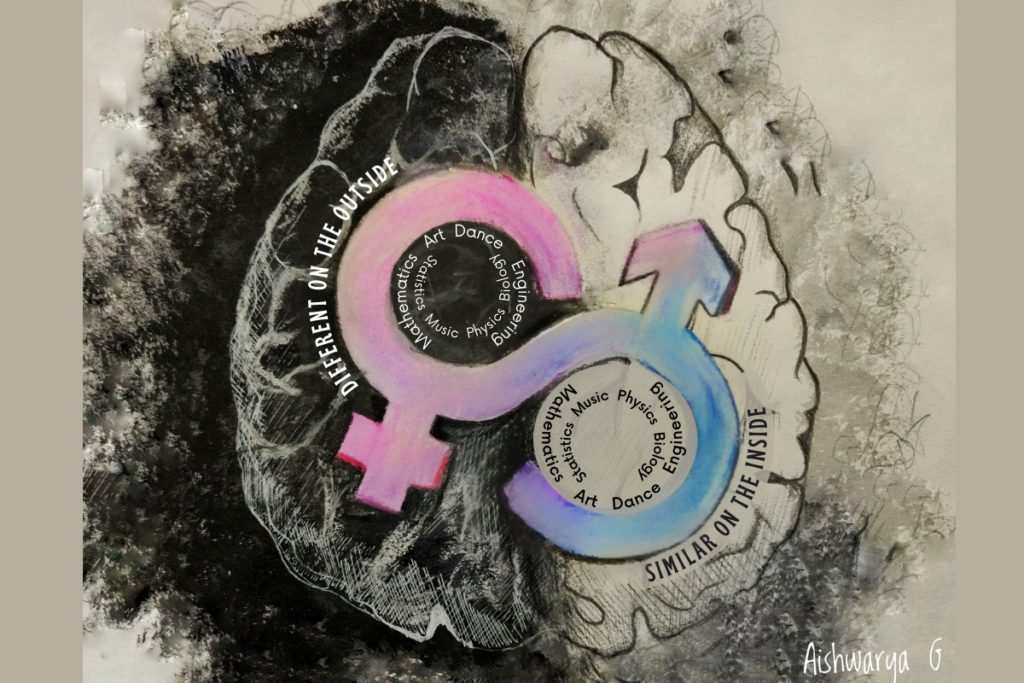Most of the times it is perceived by us, that males usually opt for subjects like mathematics and science (specially physics), whereas females prefer biology, arts and language. We usually observe males excelling in the fields that require reasoning, calculations and analytical thinking. There are females in fields like these, but not in a very significant figure. Even as a student of science, I have always been intimidated by physics! In my class, it was the boys who stood ahead in the subject. Just 4 of us girls along with 16-17 boys took up math. But when I began my college life, I could see substantial number of girls taking up subjects like mathematics, physics, and statistics. This made me ponder over some questions: Is there a biological reason behind this disparity? Are males neurologically different from females, which decide their career paths? If the genders are more or less similar, what is contributing to this discrepancy? Is our mind gender neutral? This article is all about finding answers to the aforementioned questions and helping us know more about us and that extraordinary organ well protected inside our skulls, the Brain.

A lot of research has been conducted from time to time to compare the cognitive abilities of males and females. But first, lets understand what cognitive skills are. Cognitive skills are abilities of brain through which people learn, acquire knowledge and use information for various purposes. It involves learning, memory, decision making, problem solving as well as paying attention. Our cognitive skills determine how we respond to various situations in our everyday life. From picking up a pen to driving a car, from choosing which ice cream flavor to relish on during hot summer days to applying acquired knowledge and skills in conducting crucial experiments and designing engineering marvels: everything is ruled over by our cognition.
Our brain is not hindered from developing after we reach a certain age. It is dynamic, keeps changing according to the external and biological environment and experiences, by a phenomenon called neuroplasticity. The brain keeps modifying itself according to our experiences and even helps in strengthening other areas when one area is damaged; for instance, enhancing hearing ability of a blind person.
If we consider comparison of cognitive functions between the genders, different aspects such as brain structure and development, hormones, gender stereotypes, as well as cultural differences are involved in the disparity which is seen between both the genders now a days.
The brains of males and females differ in some aspects, but it is mostly similar. Males have 10 percent larger brain but no, it won’t tamper with the intelligence possessed by both the genders. Men have larger inferio parietal lobule, which is involved in mathematical calculations, estimating time and speed. Women are found to have a larger hippocampus (helps in learning and memory), whereas males have been found to possess larger amygdala (involved in emotions and behavior), but some research denies this finding. Corpus Callosum is a bundle of cables of white matter connecting the left and right hemispheres of the brain and is found to be larger in females.
It has been observed that males have a slight advantage in spatial tasks, such as rotating 3D objects, as compared to females. Females tend to have a bit of advantage over males when it comes to verbal fluency and memory, for instance, memorizing object locations, their appearance, etc. Research conducted during the 1970s among American students suggested boys outnumbering girls in mathematical skills by a large difference. However, analysis carried out after the 1980s present that this difference is small to negligible.
Among toddlers as well, this difference can be observed at times, says research. Kindergarten girls tend to do verbal tasks better than boys, and the latter usually outshine girls in mathematics tests. One surprising study shows male infants, as young as 3 months of age, perform better in mental rotation tasks! On the contrary, there are studies which did not find any substantial differences between the two genders. The reason behind this observation isn’t very clear, but it is speculated that family, culture, and experiences while growing up can influence an individual’s cognitive skills.
It has been found that sex hormones play crucial role in the nurturing the brain. Estrogen acts as a neuroprotectant, and enhances cognitive functions in females, especially memory. Progesterone is known to protect brain from damage. In males, testosterone is also known to enhance cognitive skills, such as spatial ability. Research conducted among a group of medical students drew the conclusion that males and females in their preovulatory phase (high estrogen levels) showed comparable differences in cognition. This may be because of the analogous function of testosterone and estrogen regarding the working of the brain. However, males were found to be better than females in tasks requiring attention during their postovulatory phase (high progesterone levels). This experiment also drew the conclusion that females during their postovulatory phase, may have more advantage in tasks that require executive thinking, which includes working memory, flexible thinking and self-control.
Let’s not ignore that our brain, and eventually our activities can be affected by the environment we live in and the experiences we go through. The ability of males to perform better in mathematics is not found in each and every part of the world. Sex differences in the cognitive abilities vary from place to place. Many reasons have been speculated for the variation observed around the world.
The type of activities an individual engages in can govern her/her cognitive performance. A person indulging in action games such as IGI, Call of Duty, PUBG (that’s all I can recall now!), can enhance his/her spatial skills. In nations which do not favor gender equity a lot, the differences in mental abilities will be higher. Some researchers also say, that lack of gender neutrality in ALL the fields can influence the differences arising in cognition of the sexes. There exists a phenomenon known as stereotype threat, which implies gender stereotypes can stir up difference in the abilities of both the genders in doing the same task. Research has found that addressing women’s mathematical skills as poor can affect their performance in that subject. It was also observed that reducing this found a positive effect, wherein women became better in physics over a college semester. Some experts state the effects aren’t extremely robust and calls for further investigation. Teachers and Parents also play a role in this. It is observed that parents hold less expectations from their girl child w.r.t their mathematical proficiency. These expectations seen by the child from his/her parents may lead to shaping the cognitive skills and eventually, the career choices. There exists Gender Similarities Hypothesis which hold the notion that men and women are similar on most, but not all psychological variables and that males and females are more alike than they are different.

In conclusion, it can be said that males and females can be different regarding some or the other cognitive skills. Mostly, these differences are tiny and even negligible. It is important to address the gender gaps and stereotypes created in the society, which can help equal participation of both the sexes in most of the fields. Engaging boys and girls in similar activities in school and home and encouraging them in the subjects they are actually interested in can aid in removing notions like “ladka hua to engineer, ladki hui to doctor” (3 Idiots). Let’s get over the conception that boys are always the masters of math and physics whereas girls are always best in biology and arts. Oh, and yes, Biology is not just about memorizing scientific names and mugging up facts, folks!
Sources:
- https://stanmed.stanford.edu/2017spring/how-mens-and-womens-brains-are-different.html
- https://www.nm.org/healthbeat/healthy-tips/battle-of-the-brain-men-vs-women-infographic#:~:text=Although%20the%20male%20brain%20is,to%20be%20larger%20in%20men.
- http://www.educationalneuroscience.org.uk/resources/neuromyth-or-neurofact/girls-and-boys-have-different-cognitive-abilities/
- https://www.ncbi.nlm.nih.gov/pmc/articles/PMC4129348/#:~:text=These%20cognitive%20attributes%20are%20different,abilities%20%5B2%2C3%5D.
- https://www.verywellmind.com/what-is-brain-plasticity-2794886
- Miller, D. I., & Halpern, D. F. (2014). The new science of cognitive sex differences. Trends in Cognitive Sciences, 18(1), 37–45. doi:10.1016/j.tics.2013.10.011
Writer

Sreelakshmi S Kumar
Sreelakshmi is pursuing her undergraduate course degree in Zoology from Fergusson College, Pune. The field of Immunology and Virology interests her the most. She harbours her love for science and teaching inside her, and she wishes to teach in the future. Dancing, reading and calligraphy are some of her leisure activities and she is a big foodie too!
Illustrators


Aishwarya Girish
Anushree Krishnamurthy
Aishwarya is an undergraduate pursuing her degree in B.E Biotechnology from M S Ramaiah Institute of Technology, Bangalore.
Co-founder and Director of Website Development and Logistics


It must be ascertained that there are obvious differences between a man and a woman, and these differences make us unique in our own way, and must be respected. No two objects in this universe are the same, or equal. Other than that, I enjoyed reading the article 🙂
I completely agree to what you have mentioned. All of us are unique in our way. Through this article I have tried to convey a similar notion like yours, that irrespective of you being a male or female, you are free to choose your own path and not pay heed to notions that create inequality, even in interests and career choices. This is to remove the conception that certain subjects or skills are meant for males and others for females. Thank you for putting up your opinions, Atharv, and I am happy you enjoyed this piece!